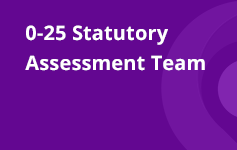0-25 Statutory Assessment Team
The Council's 0-25 SEND Statutory Assessment Team coordinates the statutory support for children and young people with special educational needs and disabilities (SEND).
Contacts details
26 West Hoe Road
PL1 3BJ
The majority of children and young people with special educational needs or disabilities will have their needs met within local mainstream early years settings, schools or colleges. Most mainstream schools/settings and colleges will be able to meet your child's special educational needs. You can use the Plymouth Online Directory to look up your child's primary school/secondary school and read their school information report, this explains how they should meet the needs of students with special educational needs in their setting.
However, some children and young people may require an Education, Health and Care needs assessment in order for the local authority to decide whether it is necessary to make provision in accordance with an Education, Health and Care Plan to support their progress. An education, health and care assessment is a process where information is collected from schools and professionals to give a clear picture of your child's or young person's education health and care needs. An Education, Health and Care needs assessment should not normally be the first step in a process of support for students with SEND, rather it should follow on from planning already undertaken with parents and young people in conjunction with an early years provider, school, post-16 institution or another provider.
At the end of the assessment process, the local authority then decides if they feel a student requires an Education, Health and Care Plan which details statutory support for children and young people with special educational needs and disabilities (SEND).
Annual review paperwork for schools and parents
Moving to Plymouth
If you're moving to Plymouth and your child has an Education, Health and Care Plan of special educational needs (or is currently undergoing assessment) please contact the 0-25 Statutory Assessment Team; email senadmin@plymouth.gov.uk or call 01752 307409 to discuss arrangements.
The team will need to receive:
- details of your child's Education, Health and Care Plan
- the date you will arrive in Plymouth
- your new address
- your family details
- the name and contact details of your previous local authority
If your preference is a mainstream school, please contact Plymouth School Admissions to discuss your child's new school. You will need to tell them that your child has special educational needs and an Education, Health and Care Plan and provide them with details about the school your child was previously attending.
If your preference is a special school and/or your child is already in a special school, this will be considered, although the local authority cannot guarantee your child will get an equivalent school in Plymouth. To request a special school admission, a request will need to be made to the local authority panel, please email senadmin@plymouth.gov.uk or call 01752 307409 to discuss the panel procedure.
If you have any questions about Education, Health and Care Plan, do not hesitate to contact the 0-25 SEND Statutory Assessment Team on 01752 307409 or at senadmin@plymouth.gov.uk
Let us know if the information on this page is wrong and needs to be updated. Want to create a page on the Plymouth Online Directory? Register for free and add a page; it only takes a few minutes.Is the information correct?
Plymouth uses an orange 'Local Offer icon' to show services that define themselves as suitable for children and young people with SEND. These are part of Plymouth's SEND Local Offer. We recommend that you contact the service provider to make sure the service is suitable for your child or young person.
- 0 to 1 years old
- 5 to 11 years old
- 12 to 16 years old
- 17 to 25 years old
- 1 to 2 years old
- 2 to 3 years old
- 3 to 4 years old
- 4 to 5 years old
- Autism
- Cerebral palsy
- Communication impairments
- Down's syndrome
- Hearing impairments
- Learning disabilities
- Mobility issues
- Physical disabilities
- Visual impairments
Back to search





